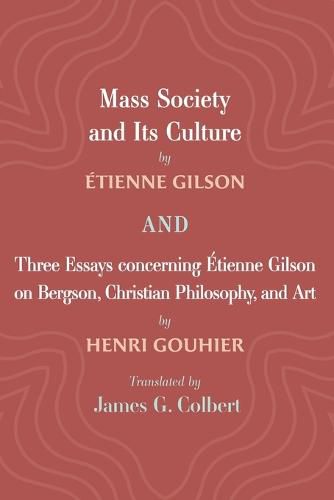Readings Newsletter
Become a Readings Member to make your shopping experience even easier.
Sign in or sign up for free!
You’re not far away from qualifying for FREE standard shipping within Australia
You’ve qualified for FREE standard shipping within Australia
The cart is loading…






This title is printed to order. This book may have been self-published. If so, we cannot guarantee the quality of the content. In the main most books will have gone through the editing process however some may not. We therefore suggest that you be aware of this before ordering this book. If in doubt check either the author or publisher’s details as we are unable to accept any returns unless they are faulty. Please contact us if you have any questions.
A medievalist and defender of the notion of Christian philosophy, Etienne Gilson had a lifelong interest in the philosophy of art. He questioned whether what is reproduced as art in contemporary society is art at all. This is not a simple issue. A cheap version of a novel is still a novel. A picture of a statue is not a statue, nor indeed is a photograph of a painting a painting. Recorded music has particular complications. The organizer of an industrial assembly line is neither an artist nor an artisan. Yet, thanks to such mass production, a much broader population has knowledge of artworks than would otherwise be possible. Religions must minister to mass societies and provide appropriate liturgies. But in the process, there is a danger of misrepresenting complex religious teachings. At the end of his own life, Henri Gouhier, Gilson's first doctoral student, prepared three essays on Gilson. The first, on Bergson, gives a sense of Gilson's formation in early twentieth-century French philosophy. The second reconstructs the development of the notion of Christian philosophy and the heated controversy it provoked. Finally, Gouhier presents Gilson's general philosophy of art and gives a helpful framework to Gilson's comments on art in a mass society.
$9.00 standard shipping within Australia
FREE standard shipping within Australia for orders over $100.00
Express & International shipping calculated at checkout
This title is printed to order. This book may have been self-published. If so, we cannot guarantee the quality of the content. In the main most books will have gone through the editing process however some may not. We therefore suggest that you be aware of this before ordering this book. If in doubt check either the author or publisher’s details as we are unable to accept any returns unless they are faulty. Please contact us if you have any questions.
A medievalist and defender of the notion of Christian philosophy, Etienne Gilson had a lifelong interest in the philosophy of art. He questioned whether what is reproduced as art in contemporary society is art at all. This is not a simple issue. A cheap version of a novel is still a novel. A picture of a statue is not a statue, nor indeed is a photograph of a painting a painting. Recorded music has particular complications. The organizer of an industrial assembly line is neither an artist nor an artisan. Yet, thanks to such mass production, a much broader population has knowledge of artworks than would otherwise be possible. Religions must minister to mass societies and provide appropriate liturgies. But in the process, there is a danger of misrepresenting complex religious teachings. At the end of his own life, Henri Gouhier, Gilson's first doctoral student, prepared three essays on Gilson. The first, on Bergson, gives a sense of Gilson's formation in early twentieth-century French philosophy. The second reconstructs the development of the notion of Christian philosophy and the heated controversy it provoked. Finally, Gouhier presents Gilson's general philosophy of art and gives a helpful framework to Gilson's comments on art in a mass society.